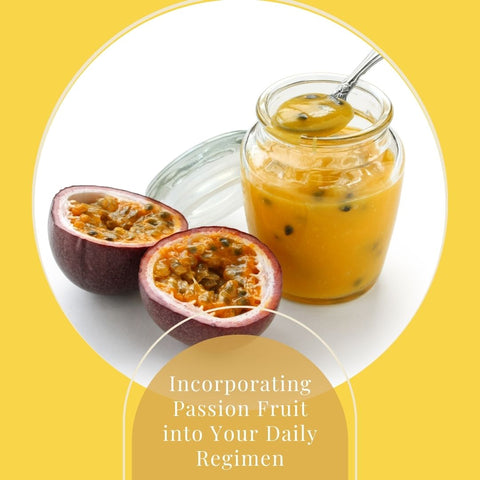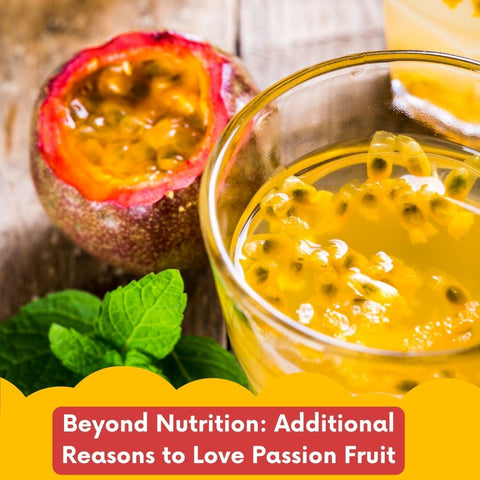Passion fruit is not only delicious, but it also provides numerous health benefits. This blog provides a comprehensive guide to its benefits.
Diving into the Nutritional Profile: What Makes Passion Fruit a Superfood

Passion fruit is considered a superfood because of its impressive nutritional profile, which includes Vitamin C, Vitamin A, dietary fibre, potassium, iron, antioxidants, low-calorie content, and hydration. These nutritional components make passion fruit a versatile and nutrient-dense addition to a healthy diet, providing a variety of health benefits.
Vitamins, Minerals, and Antioxidants: The Building Blocks of Health
Vitamins, minerals, and antioxidants are indeed the building blocks of health, with each playing unique and critical roles in the body.
-
These organic compounds are required for a variety of biochemical reactions and processes in the body. They are divided into two categories: fat-soluble vitamins (A, D, E, and K) and water-soluble vitamins (B vitamins and Vitamin C). Vitamins help to support the immune system, produce energy, and maintain bone health, vision, and skin health.
-
Minerals are inorganic nutrients that are necessary for many bodily functions, such as bone health, fluid balance, nerve function, and muscle contraction. Calcium, magnesium, potassium, sodium, iron, zinc, and selenium are a few examples of essential minerals. Each mineral has a unique role in promoting overall health and well-being.
-
Antioxidants are compounds that help neutralize harmful free radicals in the body, which can cause oxidative damage to cells and contribute to chronic diseases such as heart disease, cancer, and old age. Vitamin C, E, beta-carotene, selenium, and flavonoids are all examples of common antioxidants. They protect cells from damage, lower inflammation, and promote overall health and longevity.
Consuming a variety of foods high in vitamins, minerals, and antioxidants is critical for maintaining good health and lowering your risk of chronic diseases. Fruits, vegetables, whole grains, nuts, seeds, and legumes are all good sources of these essential nutrients and should be included in a healthy diet.
The Fiber Factor: How Passion Fruit Supports Digestive Wellness
Passion fruit is an excellent source of dietary fiber, which plays a crucial role in supporting digestive wellness in several ways:
-
Promotes Regularity: Dietary fibre bulks up the stool, promoting regular bowel movements and preventing constipation. The soluble fiber found in passion fruit forms a gel-like substance in the digestive tract, softening the stool and making it easier to pass.
-
Supports Gut Health: Fiber acts as a prebiotic, feeding the beneficial bacteria in the gut. These bacteria ferment fibre, producing short-chain fatty acids that nourish the colon's cells and promote a healthy microbiome. A diverse and balanced gut microbiome is linked to better digestion, immune function, and overall health.
-
Regulates Blood Sugar Levels: Soluble fiber helps slow down the absorption of sugar in the bloodstream, preventing spikes in blood sugar levels after meals. This can be especially useful for people who have diabetes or insulin resistance.
-
Lowers Cholesterol Levels: Some fibres, such as soluble fibre, can lower LDL (bad) cholesterol levels by binding to cholesterol particles and removing them from the body via the stool. Fibre improves heart health by lowering cholesterol absorption and the risk of cardiovascular disease.
-
Supports Weight Management: High-fiber foods, such as passion fruit, promote satiety and fullness, which can aid in weight management by lowering overall calorie intake. Fiber-rich foods take longer to digest, allowing you to feel satisfied for longer periods and lowering your chances of overeating.
Beyond Vitamin C: Uncovering the Immune-Boosting Properties
Passion fruit is known for its high vitamin C content, but it also contains a variety of other nutrients and compounds that contribute to immune-boosting properties:
-
Vitamin A: Passion fruit contains beta-carotene, a precursor to vitamin A. Vitamin A is necessary for the skin and mucous membranes to function properly as infection barriers. It also plays an important role in immune function, including the formation and activation of white blood cells that help fight pathogens.
-
Antioxidants: Passion fruit contains several antioxidants, including vitamin C, beta-carotene, and flavonoids. These compounds help to neutralize harmful free radicals in the body, reducing oxidative stress and inflammation, which can impair the immune system. By protecting cells from damage, antioxidants support overall immune function and resilience.
-
Dietary Fibre: Passion fruit contains soluble fibre, which has been linked to immune health. Fibre serves as a prebiotic, feeding beneficial bacteria in the gut. A healthy gut microbiome is necessary for normal immune function because it regulates immune responses and protects against pathogens.
-
Minerals: Passion fruit contains essential minerals such as potassium and iron, which are required for immune function. Potassium promotes fluid balance and nerve signaling, whereas iron is required for the production of red blood cells and the transport of oxygen throughout the body, including immune cells.
-
Hydration: Passion fruit is high in water, which helps to keep the body hydrated. Proper hydration is essential for optimal immune function because it promotes immune cell production and function while also facilitating the elimination of toxins and waste products from the body.
Targeted Health Benefits: From Heart Health to Weight Management

Beyond its general nutritional value, passion fruit provides specific health benefits, such as assistance with weight management and heart health:
-
Heart Health:
-
Passion fruit contains potassium, a mineral that is essential for maintaining normal blood pressure levels. Potassium counteracts the effects of sodium by increasing vasodilation and lowering the risk of hypertension and cardiovascular disease.
-
Passion fruit contains antioxidants such as vitamin C and flavonoids, which protect the heart from oxidative stress and inflammation. By reducing the buildup of plaque in the arteries and lowering LDL (bad) cholesterol levels, antioxidants support overall heart health and reduce the risk of heart disease.
-
Weight Management:
-
Passion fruit contains dietary fibre, which promotes satiety and helps control appetite. Fiber-rich foods, such as passion fruit, keep you fuller for longer, lowering your overall calorie intake and aiding in weight loss efforts.
-
Passion fruit has a low-calorie count despite its fibre and nutrient content, making it a healthy choice for those watching their weight. By providing essential nutrients without adding excess calories, passion fruit can be incorporated into a balanced diet for weight maintenance or weight loss.
A Heart-Healthy Choice: Passion Fruit's Cardiovascular Benefits
Passion fruit has several cardiovascular benefits, making it a heart-healthy option:
-
Potassium: Passion fruit is high in potassium, which is essential for maintaining healthy blood pressure levels. Potassium counteracts the effects of sodium by promoting vasodilation and relaxing blood vessel walls, which lowers blood pressure and reduces the risk of hypertension and cardiovascular disease.
-
Antioxidants: Passion fruit contains vitamin C, beta-carotene, and flavonoids. These compounds protect the heart from oxidative damage and inflammation, both of which play important roles in the development of cardiovascular diseases like atherosclerosis and heart disease. By reducing the buildup of plaque in the arteries and lowering LDL (bad) cholesterol levels, antioxidants support overall heart health.
-
Dietary Fiber: Passion fruit is an excellent source of dietary fiber, particularly soluble fiber. Soluble fibre reduces LDL cholesterol levels by binding to cholesterol particles in the digestive tract and eliminating them from the body. By reducing cholesterol absorption, fiber helps prevent the narrowing of arteries and the formation of blood clots, thus lowering the risk of heart attacks and strokes.
-
Low in Saturated Fat and Cholesterol: Passion fruit is a heart-healthy option because it is naturally low in saturated fat and cholesterol. Consuming foods low in saturated fat and cholesterol promotes healthy blood lipid levels and lowers the risk of atherosclerosis and cardiovascular disease.
Inflammation and Pain: The Natural Relief Found in Passion Fruit
Passion fruit contains a variety of compounds that may help reduce inflammation and pain:
-
Passion fruit is high in antioxidants, such as vitamin C, beta-carotene, and flavonoids. These compounds help to neutralize harmful free radicals in the body, lowering oxidative stress and inflammation. By protecting cells from damage, antioxidants may help alleviate inflammation-related pain caused by conditions such as arthritis and inflammatory bowel disease.
-
Particularly high in vitamin C, which has anti-inflammatory qualities, is passion fruit. Vitamin C modulates the body's inflammatory response by inhibiting the production of pro-inflammatory cytokines and increasing the synthesis of anti-inflammatory compounds. Adequate vitamin C intake may help reduce inflammation and pain in conditions like rheumatoid arthritis and asthma.
-
Passion fruit contains soluble fibre, which may contribute to its anti-inflammatory properties. Soluble fibre regulates the immune system and modulates inflammatory responses in the body. By promoting a healthy gut microbiome and reducing systemic inflammation, dietary fiber may help alleviate pain associated with inflammatory conditions like irritable bowel syndrome (IBS) and Crohn's disease.
-
According to some research, passion fruit may contain small amounts of bromelain, an anti-inflammatory enzyme. Bromelain has been shown to reduce inflammation and swelling, as well as pain caused by conditions like osteoarthritis and sports injuries. While the levels of bromelain in passion fruit are lower than in pineapple, they may still contribute to its anti-inflammatory properties.
Managing Weight Naturally: The Role of Passion Fruit in Diet
Passion fruit can help you manage your weight naturally for a variety of reasons:
-
Low in Calories: Despite its rich flavor, passion fruit is relatively low in calories, making it an ideal choice for those trying to lose weight. A single passion fruit typically contains around 17 calories, allowing you to enjoy its delicious taste without consuming excessive calories.
-
High in Fiber: Passion fruit is a rich source of dietary fiber, with about 6 grams per serving. Fiber helps promote feelings of fullness and satiety, which can reduce overall calorie intake by preventing overeating. Additionally, fiber slows down digestion, helping to stabilize blood sugar levels and prevent spikes in hunger and cravings.
-
Low in Fat: Passion fruit is naturally low in fat, particularly saturated fat, which is associated with weight gain and increased risk of cardiovascular disease. By incorporating low-fat foods like passion fruit into your diet, you can help control calorie intake and maintain a healthy weight.
-
Hydration: Passion fruit has a high water content, which can help keep you hydrated and promote feelings of fullness. Staying hydrated is essential for overall health and can support weight management by preventing dehydration, which can sometimes be mistaken for hunger.
-
Nutrient Density: Despite being low in calories, passion fruit is packed with essential nutrients such as vitamin C, vitamin A, potassium, and dietary fiber. Consuming nutrient-dense foods like passion fruit ensures that you get the vitamins, minerals, and antioxidants your body needs to function optimally, even while managing your weight.
Incorporating Passion Fruit into Your Daily Regimen

Incorporating passion fruit into your daily routine is simple and delicious. Here are some suggestions for enjoying this nutritious fruit:
-
Fresh: Cut passion fruit in half and scoop out the pulp with a spoon. If desired, sprinkle sugar or honey on top for added sweetness.
-
Smoothies: Incorporate passion fruit into your favorite smoothie recipes for a tropical twist. All you have to do to get a creamy texture is blend the pulp with other fruits like banana, pineapple, or mango, and some yoghurt or milk.
-
Salads: To add a taste and nutritional boost, incorporate passion fruit into your salads. The pulp can be added to the salad by itself or combined with olive oil, vinegar, and seasonings to create a zesty dressing.
-
Desserts: Fruit salads, sorbets, and ice cream can all benefit from the tropical touch that passion fruit brings. The pulp can also be used to make a delectable pavlova or cheesecake topping with passion fruit.
-
Cocktails and Mocktails: For a cool twist, add passion fruit pulp or juice to your favorite concoctions. Passion fruit pairs well with rum, vodka, and tequila, as well as with sparkling water or lemonade for non-alcoholic options.
-
Sauces and Marinades: Use passion fruit pulp to make flavorful sauces and marinades for meat, poultry, or seafood dishes. Combine it with ingredients like garlic, ginger, soy sauce, and honey for a delicious glaze or dipping sauce.
-
Baking: Incorporate passion fruit into baked goods like muffins, cakes, and tarts for a unique and tropical flavor. You can use the pulp in the batter or filling, or drizzle it on top as a glaze.
You can take advantage of passion fruit's many health advantages and savor its delicious flavor by incorporating it into your daily routine in these inventive ways. Passion fruit lends a tropical flair to any dish or beverage, whether it is consumed raw, blended into recipes, or used as a flavoring agent.
Creative Ways to Add Passion Fruit to Your Meals and Snacks
Passion fruit can add a burst of tropical flavor to your meals and snacks while also providing a nutritional boost. breakfast ideas, snack time, lunch and dinner, desserts, and beverages are all creative ways to incorporate passion fruit into your culinary creations. Get creative and try new ways to incorporate passion fruit into your meals and snacks to enjoy its distinct flavor and nutritional benefits. Passion fruit, whether used in sweet or savory dishes, adds a delightful tropical flair to any recipe.
Hydration and Refreshment: Delicious Passion Fruit Beverages
Passion fruit is an excellent ingredient for making refreshing and hydrating drinks. Delicious options include Passion Fruit Lemonade, Passion Fruit Iced Tea, Passion Fruit Mojito, Passion Fruit Smoothie, Passion Fruit Sparkling Water, Passion Fruit Sangria, and Passion Fruit Margarita. These passion fruit beverages are not only tasty but also great for staying hydrated and refreshed, especially on hot days. Experiment with different combinations and adjust the sweetness to your preferences.
Allergies and Sensitivities: Navigating Passion Fruit Consumption Safely
While passion fruit is generally considered safe for most people to consume, those who are allergic or sensitive to certain fruits should exercise caution. Here are some considerations for safely consuming passion fruit:
-
Allergies: Some people may be allergic to passion fruit or other fruits from the same botanical family, such as kiwi, mango, or pineapple. If you have a known allergy to these fruits, you should avoid passion fruit to avoid allergic reactions that can range from mild itching or hives to severe anaphylaxis.
-
Oral Allergy Syndrome (OAS): People who are allergic to pollen, particularly birch, mugwort, or ragweed, may develop oral allergy syndrome (OAS) after eating certain fruits, such as passion fruit. OAS symptoms include itching or tingling sensations in the mouth, lips, or throat that occur shortly after eating raw fruits or vegetables. Cooking or processing the fruit may lower the risk of OAS symptoms.
-
Cross-Contamination: If you have a severe allergy to passion fruit or other fruits, you must avoid cross-contamination during food preparation. Avoid dishes or beverages with passion fruit as an ingredient, and notify restaurant staff or hosts of your allergy to ensure that your food is prepared safely.
-
Consultation with Healthcare Provider: If you are concerned about eating passion fruit due to allergies or sensitivities, you should consult with your healthcare provider or allergist for personalized advice. They can advise you on whether it is safe to include passion fruit in your diet, as well as how to manage allergies and potential reactions.
-
Alternatives: If you are unable to consume passion fruit due to allergies or sensitivities, there are numerous other fruits and alternatives to try. Consider including fruits that you tolerate well in your diet, such as apples, oranges, berries, or melons, to reap similar health benefits.
Beyond Nutrition: Additional Reasons to Love Passion Fruit

There are numerous other reasons to adore passion fruit in addition to its remarkable nutritional profile:
-
Sweet and tangy notes combine to create a unique flavor that makes passion fruit a delicious addition to a wide range of dishes and beverages. Passion fruit has an exotic flavor. Its flavor profile makes it a versatile ingredient in culinary creations, adding depth and complexity to both savory and sweet recipes.
-
Passion fruit pulp's vivid color enhances the visual appeal of food and drinks, making them more alluring and delicious. Whether used as a garnish, topping, or main ingredient, passion fruit adds a pop of color that enhances the presentation of food and drinks.
-
The aroma of fresh passion fruit is invigorating and uplifting, evoking feelings of vitality and tropical bliss. Simply cutting open a ripe passion fruit releases its delightful fragrance into the air, creating a sensory experience that lifts the mood and stimulates the senses.
-
Passion fruit is culturally significant in many tropical regions where it grows, such as South America, Southeast Asia, and Oceania. It is frequently used in traditional cuisines, beverages, and folklore, indicating its significance as a symbol of abundance, fertility, and vitality in these cultures.
-
In addition to their culinary uses, passion fruit vines are prized for their ornamental value in gardens and landscapes. The passion fruit vine's lush foliage and colorful flowers add beauty and charm to outdoor spaces, making it an excellent choice for trellises, arbors, and fences.
-
Passion fruit is a low-maintenance crop that prefers warm, tropical climates and well-drained soil. It requires fewer inputs, such as water and fertilizer, than some other fruits, making it a sustainable option for farmers and gardeners alike.
-
In traditional medicine systems, passion fruit has been used for its potential health benefits, including its calming and sedative properties. Some cultures use passion fruit leaves, flowers, or extracts for a variety of medicinal purposes, including relaxation, improved sleep quality, and anxiety relief.
Skin Health and Beauty: The External Benefits of Passion Fruit
When applied topically, passion fruit provides the following external benefits for skin health and beauty:
-
Antioxidants: Passion fruit contains antioxidants like vitamin C and flavonoids, which help protect the skin from environmental stressors like UV radiation, pollution, and toxins. These antioxidants combat free radicals and prevent premature aging, such as wrinkles, fine lines, and sagging skin.
-
Hydration: Passion fruit pulp's high water content hydrates and moisturizes the skin, leaving it soft, supple, and radiant. Applying passion fruit topically can help keep skin hydrated and prevent dryness, flakiness, and irritation.
-
Vitamin A: Passion fruit contains beta-carotene, a precursor to vitamin A, which is necessary for skin health. Vitamin A promotes cell turnover and regeneration, which helps to keep skin smooth and even and reduces the appearance of blemishes, acne scars, and hyperpigmentation.
-
Exfoliation: Passion fruit pulp contains natural enzymes like bromelain, which can gently exfoliate the skin, removing dead skin cells and promoting a brighter, more youthful appearance. Regular exfoliation with passion fruit can help to improve skin texture, tone, and clarity.
-
Anti-Inflammatory: Passion fruit contains anti-inflammatory compounds that can soothe and calm irritated or inflamed skin. Applying passion fruit topically can help reduce redness, swelling, and discomfort associated with conditions like acne, eczema, and sunburn.
-
Production of Collagen: The vitamin C in passion fruit encourages the skin's natural production of collagen, giving it elasticity, resilience, and firmness. To keep the skin's integrity and structure intact and help avoid wrinkles and sagging, collagen is necessary.
7. Brightening: By removing dead skin cells and minimizing the appearance of dark spots, sun damage, and discoloration, the natural acids in passion fruit, like citric acid, can help brighten and even out the tone of the skin.
Stress Reduction and Mental Well-being: A Natural Approach
Passion fruit can help reduce stress and improve mental health through a variety of mechanisms, including:
-
Passion fruit contains magnesium, which is known for its relaxing and stress-relieving properties. Magnesium helps regulate neurotransmitters in the brain, including serotonin, which is important for mood regulation. Consuming magnesium-rich foods, such as passion fruit, can aid in relaxation and reduce feelings of stress and anxiety.
-
Passion fruit contains antioxidants such as vitamin C and flavonoids, which help the body combat oxidative stress. Oxidative stress can exacerbate mental health problems like anxiety and depression. Antioxidants in passion fruit promote overall brain health by neutralizing free radicals and may help alleviate stress and anxiety symptoms.
-
Passion fruit contains vitamin B6, which helps synthesize neurotransmitters like serotonin and dopamine. These neurotransmitters are essential for mood regulation, stress management, and overall mental health. Consuming foods high in vitamin B6, such as passion fruit, can help maintain a positive mood and reduce stress.
-
Staying hydrated is critical for maintaining optimal brain function and mental health. Passion fruit is high in water, making it a hydrating snack that can help maintain cognitive function and mood stability throughout the day.
-
The aroma of fresh passion fruit is uplifting and invigorating, which can improve mood and mental well-being. Simply smelling the fragrance of passion fruit can help reduce stress, promote relaxation, and improve mood.
-
Eating passion fruit with mindfulness can enhance its stress-reduction benefits. Take the time to savor the fruit's flavor, texture, and aroma, paying attention to each bite and staying in the present moment. Mindful eating can help reduce stress, improve digestion, and promote a better sense of well-being.
Passion Fruit in Culinary Arts: Enhancing Flavors and Aroma
Passion fruit is a versatile culinary ingredient with a distinct flavor and aroma profile that can enhance a variety of dishes. Here are some ways passion fruit can be used to elevate flavors and aromas in cooking and baking:
-
Tropical Desserts: Passion fruit adds a tropical flavor to cakes, tarts, pies, and custard. Its tangy and sweet flavor complements creamy textures, making it a popular filling, sauce, and glaze ingredient.
-
Fruit Salads: Passion fruit is tart and aromatic notes enhance the overall flavor profile of fruit salads. It pairs well with other tropical fruits such as mango, pineapple, and kiwi, resulting in a vibrant and refreshing combination.
-
Sauces and Dressings: Passion fruit pulp can be used to create tangy and flavorful sauces and dressings for savory dishes. Combining it with citrus juice, honey, olive oil, and herbs yields a versatile dressing for salads, grilled meats, and seafood.
-
Drinks: Passion fruit juice or pulp can be used to make smoothies, cocktails, mocktails, and iced teas. Its bright and tangy flavor adds depth to beverages, making them more vibrant and enjoyable.
-
Marinades and Glazes: Passion fruit can be added to marinades and glazes for meats, poultry, and seafood. Its acidity helps to tenderise the protein while also providing depth of flavor and a glossy finish to the dish.
-
Sorbets and Sorbetto: Passion fruit sorbet or sorbetto is a delicious and refreshing dessert option ideal for hot summer days. Its intense flavor and natural sweetness make it an excellent choice for frozen desserts.
-
Chutneys and Relishes: Passion fruit can be used to make chutneys and relishes that complement savory dishes like roasted meats, grilled vegetables, and cheese platters. Its tangy and aromatic flavor profile adds depth and balance to the dish.
-
Cakes and Pastries: Adding passion fruit to cake batters, fillings, and frostings enhances the flavor and moisture of baked goods. It can be used to make a memorable and indulgent treat by layering cakes, cupcakes, muffins, and pastries.
Embracing Passion Fruit: Tips for Selection, Storage, and Preparation

Incorporating passion fruit into your culinary adventures is a delightful experience! Here are some tips for choosing, storing, and preparing passion fruit:
-
Selection: Look for passion fruits with wrinkled, wrinkled, or dimpled outer skins, which indicate ripeness. The skin color of passion fruits varies depending on the variety, but ripe ones are typically deep purple or yellow-orange. Avoid passion fruits with blemishes, soft spots, or mould, as these may indicate spoilage.
-
Storage: Unripe passion fruits should be stored at room temperature until they have ripened. Once ripe, refrigerate to keep them fresh. If you want to use the passion fruit pulp later, scoop it out and store it in an airtight container in the refrigerator for up to a week, or freeze it for longer storage.
-
Preparation: Simply cut a passion fruit in half with a sharp knife and use a spoon to scoop out the pulp. The pulp contains small, flavorful edible seeds. Passion fruit pulp can be eaten on its own or used in a variety of sweet and savory recipes, including smoothies, desserts, salads, sauces, and marinades. For recipes that require passion fruit juice, strain the pulp through a fine mesh sieve to remove the seeds and extract the juice.
-
Flavor Pairings: Passion fruit complements a variety of foods, including tropical fruits like mango, pineapple, and coconut, as well as citrus fruits like lime and orange. It also works well with creamy textures like yoghurt, whipped cream, and ice cream, as well as savory ingredients like seafood, poultry, and pork.
-
Experimentation: Do not be afraid to get creative and try out different ways to incorporate passion fruit into your dishes. Passion fruit, whether used as a main ingredient or as a garnish, adds a burst of flavor and a tropical flair to any dish.
By following these selection, storage, and preparation tips, you can make the most of your favorite fruit and enjoy its delicious flavor in a variety of culinary creations. So embrace the passion fruit and let your taste buds experience its tropical goodness!
















